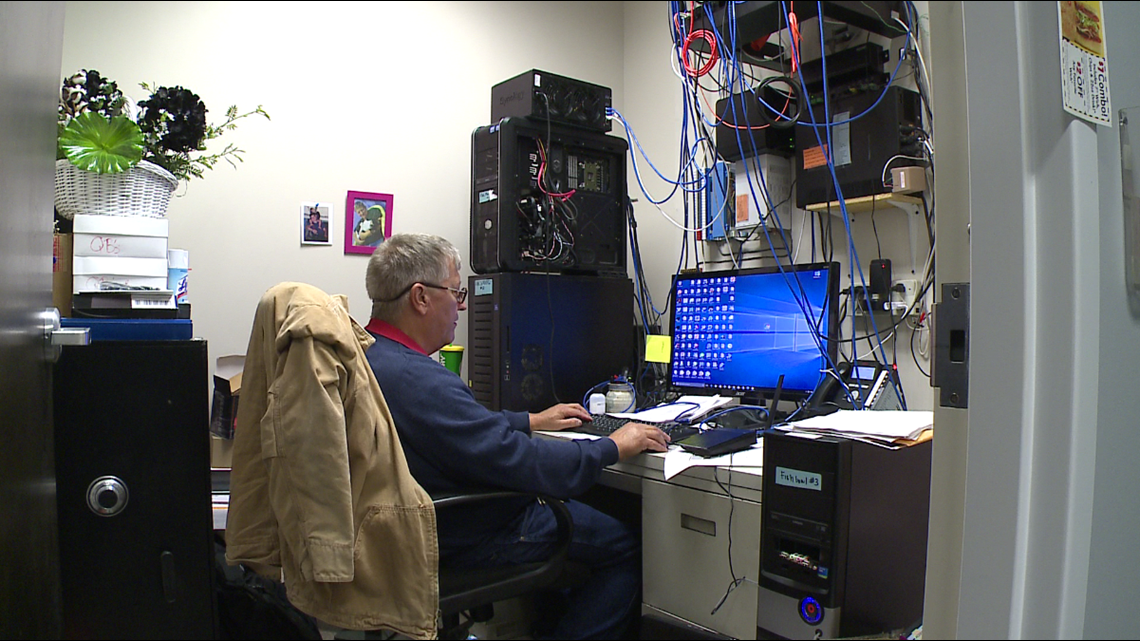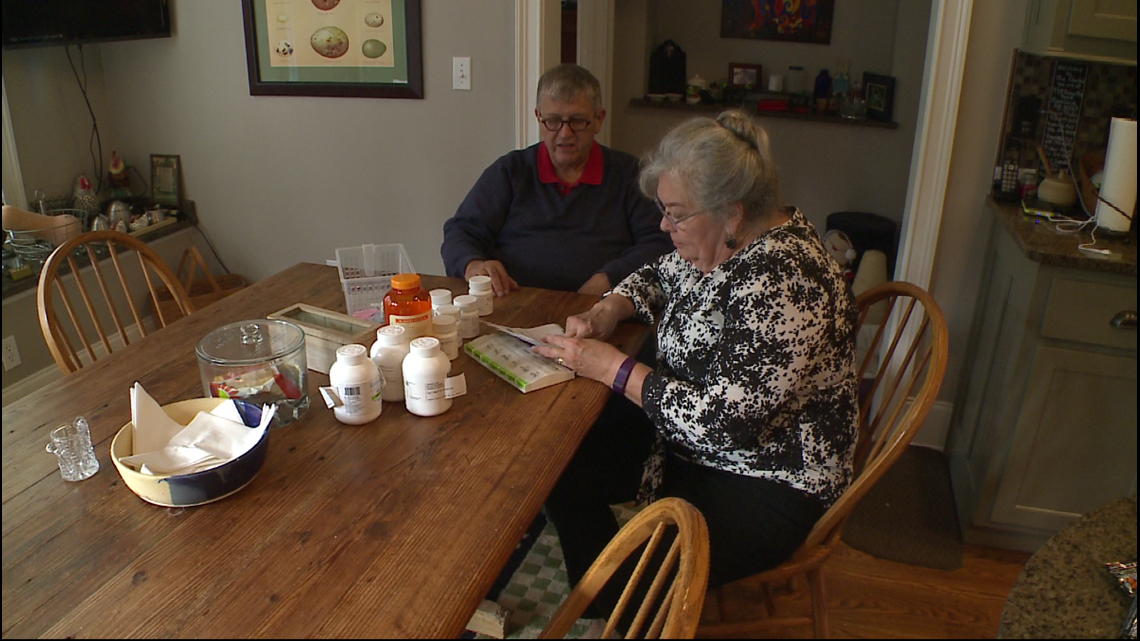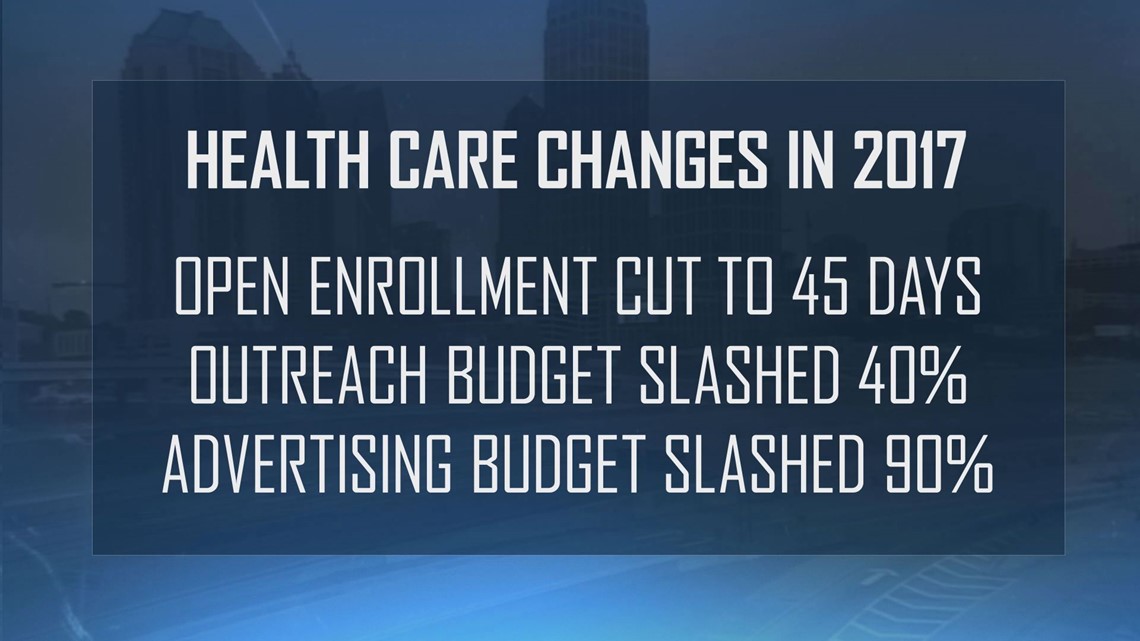This story is part of an Untold Atlanta special report called Georgia in Trump's America. Watch the full version here.
It’s pretty rare to just barge into the office of a president of a company, but Lola has that privilege.
The black and white dog waltzes in to Charlotta Clark’s corner office at a packing plant in northeast Georgia.
Lola assumes her position on Charlotta’s lap. It’s where you can find her on most work days, unless she chooses to stay with Larry.


Larry is Charlotta’s husband and the founder and CEO of RNC Industries. Unlike the president of the company, this CEO chooses to work in the server room. After 27 years in business, Larry only occupies about 20 square feet on the nearly five acres of space he worked to build.
It’s a sacrifice his employees see everyday, in addition to the one they don’t.


“I’m in stage four kidney failure,” Larry says. It’s barely a month before open enrollment begins for the 2018 insurance coverage year, and once again, Larry will be forced to buy an individual plan offered on the marketplace.
“With my kidney issues, I can’t be on the company health plan. It would blow up the price of it ridiculous.”
If Larry were to go on the company health plan, his employees would be forced to pay an addition $20 to $30 per month. To most, that inflation isn’t “ridiculous”, but to Larry, it’s unacceptable.
Larry has built his business by never losing sight of the responsibilities the title of CEO carries. He takes a personal and professional interest in whether his product is performing as his customers expected. He places a high priority in consistency and quality of the product he supplies and the service he provides.
Larry also cares deeply about how his decisions impact his employees—people who he knows have personal budgets that can impact families and plans for the future.
Larry’s customers and employees are his constituents. He would rather make a personal sacrifice, even one that could be to his fiscal and physical detriment, than allow an employee or customer to take a loss. It’s a matter of principle, and it comes with the title of CEO.
If only all high-ranking decision makers worked as hard at being so selfless…


Larry and Charlotta are probably not the only Americans in this situation. But so rarely do we hear from people experiencing American health care from both sides: as a small business owner who provides plans and an individual who is seeking coverage for themselves at the same time.
Charlotta compares the healthcare market to a game of chess in that “you’re moving, you’re maneuvering, you’re trying to figure out who’s going to win, and none of us are going to win.”
The Clark’s personal healthcare woes are nothing new. Larry’s kidney disease is genetic and gets progressively worse as time passes. Larry says he lived with stage three kidney failure for about 30 years, but was diagnosed stage four just a few years ago. Every year for the past four years, the Clarks have had to either find a new insurance carrier or a new plan. The cancellation always occurs at the end of the year, forcing the Clarks to quickly study up on the details of a new policy, while also trying to find new doctors and stockpile enough of Larry’s medication to get him through the transition.


Neither Charlotta nor Larry ever saw the Affordable Care Act as an answer to America’s healthcare dilemma, and are by no means satisfied with the guidance from President Donald Trump and Congress on the healthcare issue. She’s tired of hearing the “repeal and replace” mantra with no action to follow it up.
“Every year our policy is cancelled. Every year it’s ‘We’re not gonna offer that policy anymore. We’re not gunna offer it.’ What are you gonna offer me?” she says in frustration.
Larry and Charlotta turned to Al Schiebel for help. Al is an insurance agent and the past president of the Georgia Association of Health Underwriters. Using just two words, he can some up how the inconsistent rhetoric, failed bills and overall congressional inaction is affecting the healthcare marketplace in Georgia: more confusion.


“A lot of individuals are getting letters from carriers saying, ‘We’re not gonna be in the marketplace this year.’ ‘We’re not going to be able to offer individual health insurance to you next year,” Al explains.
He says most of the conversations with his clients revolve around the same question.
“‘What am I going to do?’ That’s the biggest thing. ‘What am I going to do?’”
Scheibel says he’s seeing more and more middle-class customers falling through the gaps. These clients don’t qualify for federal subsidies, but can’t afford the double-digit hike in premiums. Some chose to forego coverage all together.
“This is going to be a brand new phenomena.” Scheibel says. “I think the numbers will grow.”
Scheibel calls himself a fiscal conservative. He can’t stand the Affordable Care Act and doesn’t blame President Trump for it’s struggles.
“The President is not the king, contrary to popular belief,” Scheibel says. “He’s not the king and he has to rely on Congress and there’s no bitartisanism.”
He laments how this lack of bipartisanism neuters the possibility for incremental legislative fixes. Scheibel says he’s been called to Washington to consult on various healthcare dilemmas, but in his experience, the solutions posed to lawmakers inevitably stall in the partisan back and forth, further delaying plans for implementation. It’s a big reason why, Scheibel believes, both parties resort to broad sweeping bills and unilateral action.
Scheibel adds that the emphasis of “repealing and prelacing Obamacare” obscures the larger problems facing the American healthcare system, including transparency in costs and rising prescription drug costs.
Which brings us back to Larry and Charlotta Clark.
The pair are sitting at the dining room table taking inventory of Larry’s medication. This has become a familiar scene this time of year.
“One of my drugs, it was 2,700 dollars for 90 days,” Larry says looking at the bottles scattered before him.
For now, the Clarks can afford the hit, but they worry about those who can’t, including those they employ.
“The saddest part for me is, when I look at the business, the founder and CEO of the company can’t even be on the company health plan,” Carlotta says.
Most of all, they try not to worry about how another year of inaction will affect us all.
This story is part of an Untold Atlanta special report called Georgia in Trump's America. Watch the full version below.
EMBED EMBED EMBED



